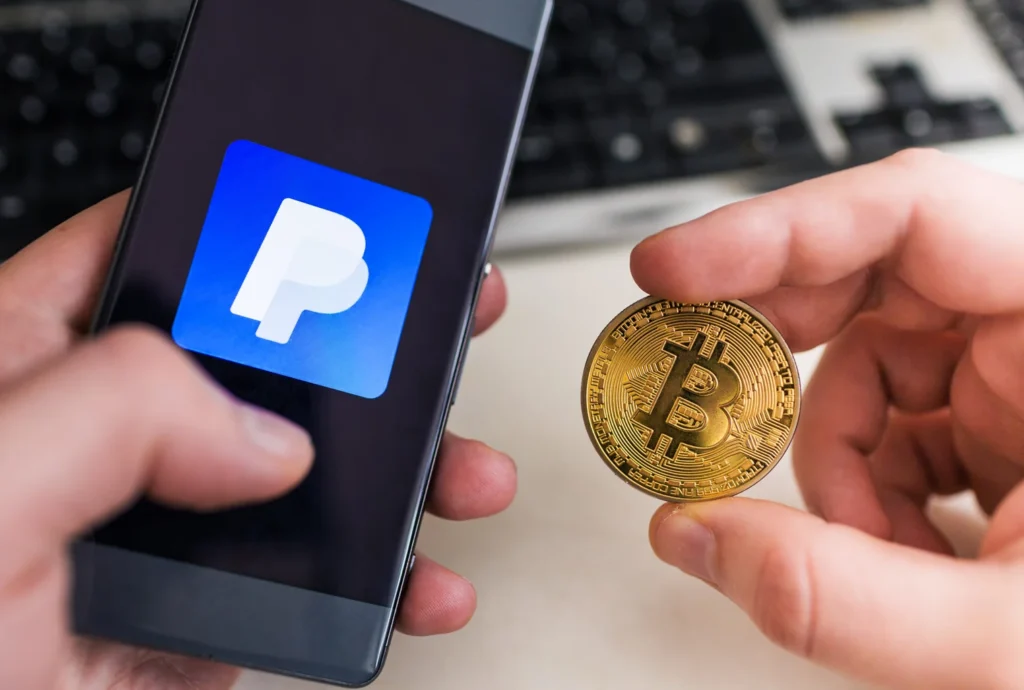In today’s fast-paced digital world, cryptocurrencies have transitioned from a niche interest to a mainstream financial tool. With major platforms like PayPal entering the cryptocurrency arena, accessing and managing digital currencies has never been easier.
This article delves into the details of PayPal’s involvement with cryptocurrencies, offering a thorough exploration based on the guide available at [this link](https://noticiascripto.site/wberone-pagina-de-inversion-paypal-payeer-bitcoin/).
This comprehensive guide covers the fundamentals of cryptocurrencies, PayPal’s role in the space, how to effectively use the platform, and more. By the end of this article, you’ll be well-prepared to embark on your cryptocurrency journey with PayPal.
Understanding Cryptocurrencies:
What is Cryptocurrency?
Cryptocurrency is a form of digital or virtual currency that leverages cryptographic techniques to secure transactions, control the creation of new units, and verify asset transfers. Unlike traditional fiat currencies issued by governments, cryptocurrencies operate on decentralized networks, which means they are not regulated by any central authority or institution.
This decentralized nature is achieved through the use of blockchain technology—a distributed ledger that records all transactions across a network of computers.
The most well-known cryptocurrency is Bitcoin, which was created in 2009. Since then, thousands of alternative cryptocurrencies (often called altcoins) have been developed, each with its unique features and use cases.
Cryptocurrencies offer several advantages over traditional financial systems, including lower transaction fees, faster transaction times, and greater financial privacy.
Blockchain Technology: The Backbone of Cryptocurrency

Blockchain technology is the foundational structure that makes cryptocurrencies possible. A blockchain is essentially a chain of blocks, each containing a list of transactions. These blocks are linked together in a chronological order, creating a secure and immutable record of all transactions.
Key features of blockchain technology include:
- Decentralization: Unlike traditional databases that are controlled by a single entity, a blockchain is maintained by a network of computers (nodes). Each node has a copy of the entire blockchain, ensuring that the system remains operational even if some nodes fail.
- Transparency: Transactions recorded on a blockchain are visible to all participants in the network, which promotes transparency and trust.
- Security: Cryptographic algorithms are used to secure the data within each block and link blocks together. This makes it extremely difficult for anyone to alter or tamper with the transaction history.
- Consensus Mechanisms: To validate and add new transactions to the blockchain, the network uses consensus mechanisms like Proof of Work (PoW) or Proof of Stake (PoS), which ensure that all participants agree on the validity of transactions.
Read: Https://Fotise.Com/Que-Es-Una-Hipoteca – Ultimate Guide to Understanding Mortgages!
Popular Cryptocurrencies Supported by PayPal:
PayPal’s Entry into the Cryptocurrency Market:
PayPal’s entry into the cryptocurrency market represents a significant shift in how digital currencies are accessed and used. Since its launch of cryptocurrency services in 2020, PayPal has made it easier for millions of users to buy, sell, and hold digital assets directly from their PayPal accounts.
Key aspects of PayPal’s involvement include:
- Integration with Existing Accounts: PayPal users can access cryptocurrency features through their existing PayPal accounts, simplifying the process of engaging with digital currencies.
- Support for Multiple Cryptocurrencies: PayPal supports several popular cryptocurrencies, allowing users to diversify their holdings within one platform.
- Ease of Use: The user-friendly interface and seamless integration with PayPal’s other financial services make it easy for both new and experienced users to manage their cryptocurrency investments.
Why PayPal’s Involvement is a Game-Changer:
PayPal’s involvement in the cryptocurrency space is transformative for several reasons:
- Increased Accessibility: By integrating cryptocurrency features into its widely used payment platform, PayPal lowers the barrier to entry for users who may be new to digital currencies.
- Enhanced Security: PayPal’s robust security infrastructure provides users with a secure environment to buy, sell, and hold cryptocurrencies. This includes advanced encryption and fraud detection mechanisms.
- Streamlined Transactions: Users can seamlessly use cryptocurrencies for purchases and transfers within the PayPal ecosystem, offering a convenient way to manage digital assets alongside traditional currencies.
- Market Influence: PayPal’s involvement brings mainstream credibility to cryptocurrencies, encouraging broader adoption and acceptance of digital currencies.
The Benefits of Using PayPal for Cryptocurrency Transactions:
Using PayPal for cryptocurrency transactions offers several notable benefits:
- User-Friendly Interface: PayPal’s platform is designed to be intuitive and easy to use, making it accessible for users at all levels of experience.
- Integrated Financial Services: Users can manage their cryptocurrency holdings alongside other PayPal financial services, such as checking and savings accounts, credit cards, and payment transfers.
- Enhanced Security Features: PayPal employs a range of security measures, including encryption and multi-factor authentication, to protect users’ digital assets.
- Instant Transactions: Cryptocurrency transactions on PayPal are processed quickly, allowing for near-instant transfers and conversions between digital currencies and fiat currencies.
Getting Started with Cryptocurrency on PayPal:
Creating a PayPal Account:
To get started with cryptocurrency on PayPal, you first need to create a PayPal account. Here’s how:
- Visit the PayPal Website or App: Go to the PayPal website or download the PayPal app from your device’s app store.
- Sign Up: Click on the “Sign Up” button and select the type of account you want (Personal or Business).
- Provide Your Information: Enter your email address, create a password, and provide other required information, such as your name, address, and phone number.
- Verify Your Identity: Follow the prompts to verify your identity, which may include uploading identification documents and linking a funding source (like a bank account or credit card).
Enabling Cryptocurrency Features:
Once you have your PayPal account set up, you can enable cryptocurrency features:
- Log In to Your Account: Access your PayPal account through the website or app.
- Navigate to the Crypto Section: Click on the “Crypto” tab or section to explore available cryptocurrency options.
- Enable Cryptocurrency Trading: Follow the instructions to activate cryptocurrency trading and management features. This may involve agreeing to additional terms and conditions.
Setting Up a Cryptocurrency Wallet:
PayPal provides a built-in cryptocurrency wallet for storing and managing your digital assets:
- Access the Crypto Section: Go to the “Crypto” tab in your PayPal account.
- Set Up Your Wallet: Follow the on-screen instructions to create and secure your cryptocurrency wallet. This includes setting up security measures like multi-factor authentication.
- Add Funds: Transfer or purchase cryptocurrency through PayPal to start using your wallet.
Buying Cryptocurrency on PayPal:

Step-by-Step Guide to Buying Cryptocurrency:
Here’s how you can buy cryptocurrency on PayPal:
- Log In to Your PayPal Account: Access your account through the website or app.
- Go to the Crypto Section: Click on the “Crypto” tab to view the available cryptocurrencies.
- Choose Your Cryptocurrency: Select the digital currency you wish to buy (e.g., Bitcoin, Ethereum, Litecoin).
- Enter the Amount: Specify how much of the cryptocurrency you want to purchase.
- Review and Confirm: Check the transaction details, including the price and any fees, and confirm your purchase.
Understanding Fees and Limits:
PayPal charges fees for cryptocurrency transactions, which can vary based on the type of transaction and amount. Be aware of the following:
- Transaction Fees: PayPal charges a fee for buying, selling, and converting cryptocurrencies. The fee structure is typically based on the transaction amount and market conditions.
- Limits: There may be limits on the amount of cryptocurrency you can buy or sell within a certain period. Check the limits in your PayPal account settings.
Maximizing Your Investment Potential:
To maximize your investment potential:
- Research: Stay informed about market trends and news that could impact cryptocurrency prices.
- Diversify: Consider diversifying your cryptocurrency portfolio to spread risk across different digital assets.
- Use PayPal Tools: Utilize PayPal’s tools and features to monitor your investments and make informed decisions.
Read: Jenna Aze – A Comprehensive Look at the Rising Star’s Journey
Selling Cryptocurrency on PayPal:
How to Sell Cryptocurrency:
To sell cryptocurrency on PayPal:
- Log In to Your PayPal Account: Access your account through the website or app.
- Go to the Crypto Section: Navigate to the “Crypto” tab to view your holdings.
- Select the Cryptocurrency to Sell: Choose the digital currency you want to sell.
- Enter the Amount to Sell: Specify how much of the cryptocurrency you want to sell.
- Review and Confirm: Check the transaction details and confirm the sale.
Factors to Consider Before Selling:
Before selling cryptocurrency, consider:
- Market Conditions: Analyze market trends and prices to determine the best time to sell.
- Fees: Be aware of any fees associated with selling cryptocurrency.
- Tax Implications: Understand the potential tax implications of selling digital assets, as cryptocurrency transactions may be subject to capital gains tax.
Holding Cryptocurrency in Your PayPal Wallet:
The Importance of Secure Storage:
Securing your cryptocurrency holdings is essential to protect against theft and fraud. PayPal provides robust security measures, but it’s also important to:
- Use Strong Passwords: Ensure your PayPal account password is strong and unique.
- Enable Two-Factor Authentication (2FA): Add an extra layer of security by enabling 2FA for your PayPal account.
Managing Your Cryptocurrency Portfolio:
To effectively manage your cryptocurrency portfolio:
- Monitor Your Holdings: Regularly check the performance of your digital assets using PayPal’s portfolio tracking tools.
- Stay Informed: Keep up with news and developments in the cryptocurrency market that could impact your investments.
Real-World Applications of Cryptocurrency with PayPal:

Everyday Transactions:
Cryptocurrency can be used for a variety of everyday transactions:
- Purchasing Goods and Services: Some merchants accept cryptocurrency payments, allowing you to use your digital assets for purchases.
- Transfers: Send cryptocurrency to friends and family or make payments for services directly through PayPal.
Case Studies: Businesses and Individuals Using PayPal for Cryptocurrency
- Businesses: Many businesses are adopting cryptocurrency payments to attract customers and streamline transactions. Case studies highlight how companies are integrating digital currencies into their payment systems.
- Individuals: Individuals are increasingly using PayPal to manage and spend their cryptocurrency holdings, leveraging the platform’s convenience and security.
The Future of Cryptocurrency and PayPal:
The future of cryptocurrency and PayPal is promising, with ongoing developments and innovations expected to shape the landscape:
- Increased Adoption: As more people and businesses adopt cryptocurrency, PayPal’s role in facilitating digital currency transactions will continue to grow.
- Technological Advancements: Advances in blockchain technology and cryptocurrency infrastructure will enhance the functionality and security of digital assets.
Read: Https:// Workink.Co/2hk/Aimmyv2 – A Comprehensive Overview!
FAQ’s
1. What is cryptocurrency?
Cryptocurrency is a digital currency using cryptography for security and operates on decentralized networks.
2. How does blockchain technology support cryptocurrencies?
Blockchain technology provides a secure, decentralized ledger for recording and verifying cryptocurrency transactions.
3. Which cryptocurrencies are supported by PayPal?
PayPal supports Bitcoin, Ethereum, Litecoin, and Bitcoin Cash.
4. How can I start using cryptocurrency on PayPal?
Create a PayPal account, enable cryptocurrency features, and set up a wallet to start buying, selling, and managing cryptocurrencies.
5. What are the benefits of using PayPal for cryptocurrency transactions?
PayPal offers a user-friendly interface, integrated financial services, enhanced security, and quick transaction processing.
Conclusion
PayPal’s integration of cryptocurrency services marks a significant step towards mainstream adoption of digital currencies. By providing a user-friendly platform for buying, selling, and holding cryptocurrencies, PayPal makes it easier for individuals and businesses to engage with digital assets. With its robust security features, ease of use, and seamless integration with existing financial services, PayPal offers a powerful solution for managing and utilizing cryptocurrencies. As the world of digital currencies continues to evolve, PayPal remains at the forefront, driving innovation and accessibility in the cryptocurrency space.
Read more:





